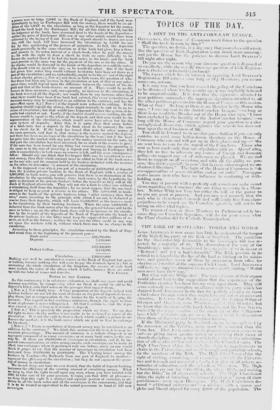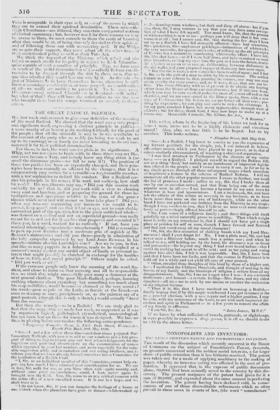TOPICS OF THE DAY.
A HINT TO THE ANTI-CORN-LAW LEAGUE.
GENTLEMEN, the House of Commons won't listen to the question " Shall the trade in corn be free?"
The question, no doubt, is a dry one; that yourselves will admit. But the question of Irish Registration is not much more mousing : and yet the House has the patience to discuss Lord STANLEY:3 bill night after night. Do you see the reason why your tiresome question is disposed of so cavalierly, while the equally tiresome question of Irish Registra- tion is (however reluctantly) eirlured? The PARTY MI/it'll ha; an interest in opposing Lord STANLEY'S Registratioo Bill retort's some forty or fifty Members; you return none—no, not OW.
It is very true that you have caused the policy of the Corn-laws to be discussed where twelve months ago it was implicitly believed to be unquestionable. It is true that the :.igu:itti•ce attached to your petitions outnumber tile aggre,.,,rate signatures attached to aa the other petitions presented to the Hawse of Com:n• is this session. What of that So long as there is no Mensbm- in the Ilouse who says, " 1 osve my seat to the Anti-Corn-law League,"—so long as there is no would-Ise-Member out of the House who says, "I have been excluded by the hostility of the Anti-Corn-law League,"--so long will the Ilouse of Commons regard your question as It nice metaphysical discussion, which ttgitates the scholls but does not bear upon the real business of life You shall be listened to in another guess fashion if you can only contrive to send some half-a-dozen Members to the Ilouse of Commons who can and will get up in their places and say—" We are sent here to vote for the repeal of the Corn-laws. Those who sent us here made only that one stipulation with us. @Kid ultra, they left us free to advocate any course of foreign and domestic policy—to support any et of statesmen we pleased. We are tieml down to support on all occasions, and with all the ability we pos- sess, 'free trade especially in corn '; but in every at hor respect we are chartered libertines." The logic of the Ilott:e of Commons is "de non-apparentilms et nun-eilstentibus pinion est ratio." Yon-aPP61- i•entes means men who have nu influence in coaferring or with- holding scats.
You may at present with a perfectly safe conscience make sound views regarding the Corn-laws the one thing necessary in a Mem- ber. Neither 1Vhig nor Tory has either the will or the power to do you any good at present. And you may rest assured, that the man who is clear-headed enough and sufficiently free from class- prejudices to be sound on the Corn-law question, will not be far wrong on other vital topic.-:.
The return of two or three Members to Parliament solely be-
cause they :Ire Corn-law Repealers, will do for your what the Clare election did for Catholic Emancipation.
TILE KIRK OP S('t/T1..ANI): TORIES 11:‘.:1) WHIGS.
Lotus ABERDEEN is 1101v aware how little he understood the temper of the high-flying Isirty of the Kirk of Scotland. The candidate for the \Ioaleratorsilip favourable to his Lordship's bill was re- jected. by it majority. of 48. discussion of the ease of the Strathhoggie ministers tertu:e'sted in :s majority of :s1 its favour of "ltetreat ? no not a hair's-breadth." The kirk persists in its refusal to acknowlede the law of the land as binding on its minis- ters, and punishes seven of them by suspension li-ont office for obeying an interdict of the supreme Civil Cosirt. Lord Ath uJ,EEN trill now, yre ..upposc, abandon his measure : gently sighing, "
men most have their way."
But trhat will the \Vhigs do? The tone If the -Alinisterial p.rly ic. 1 ;.o, '•.. -.1 by the accession of the 's'eHst.-. 1-t k' than the Veto Act. Tle«t i.; end—as giving than ....,s;•;.tc.- tuos •i• their views of church-less iplinr, ti;s:. .;.,r •0. !: t!',e subordina- tion of all secsdar • Courts. The High ('Inurclintca el:,ii:t ui,jtuintnients to chairs in the Universities, and i parochial schools, for the members of the Rik. :7.1:m en claim the Veto is acceptable hi their eyes only as one cf Me menus by which they are to extend their spiritual domination. These men—the f Ugh Churchmen--arc illiberal, they entertain exaggerated notions of clerical supremacy; but, however much for these reasons we may be averse to them, we west concede to them the merit of knowing what they would be at, of being sincerely devoted to their opiniess, and of following them out with unwavering zeal. It' the Whigs are to gain their support, they must adopt all the ol her itcu of their ecclesiastical policy as well as their Veto Act. We think the flig-end of the Ministry, hich red:ea and ob- taieed so much credit for its policy in regard to It:sh Education. quite capable of such a sacrifice of principle. Nay, we have seen go much of the sinlid determination of (so-called) Rerosin consti- tuencies to be dranged through the dirt by these men, that we question whether they would loee one vote by it. As the sole oh. ject of Ministers Is to keep theniselvee in—as character is with them a secondary «msideretien, or more psoeesle mem censideration at all—we really see nothic; to prevent mt. To be :,me, every I)'.:;ter—evcry ratienel Churchmen in Saoiland--will steer ; but what of that they sill have the satisfltction to see the men who brought lion: into the serape trounced as ecrosely e; them- sedves.



























 Previous page
Previous page